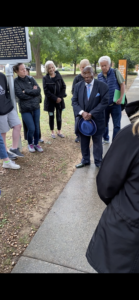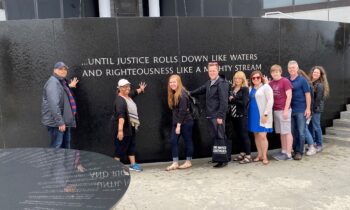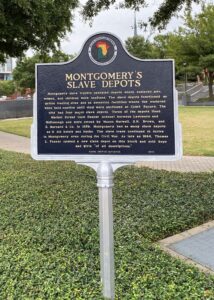Ministry Imagination Grants: Imagine. Innovate. Initiate.
By Nick Tangen
In 2019 congregants from Redeemer Lutheran Church in North Minneapolis and Westwood Lutheran Church in St. Louis Park traveled to Montgomery, Alabama, to visit the recently-opened National Memorial for Peace and Justice, a site dedicated to the painful legacy of slavery and Jim Crow. The pilgrimage to this site was part of an ongoing relationship between the two faith communities focused on racial equity and was funded by a Ministry Imagination Grant of the Minnepolis Area Synod.
“There were many trips sponsored by other Lutheran congregations to Alabama, but it was more of a Civil Rights review,” said Pastor Babette Chatman, co-university pastor at Augsburg University and a leader and member of Redeemer Lutheran Church. “What was different about us and our intentionality is that ours was about racial justice. We weren’t going there to walk the path of Martin Luther King, because, for us, we thought ‘We’re beyond this,’ and now we need racial justice.”
“The work of racial justice no longer exists as simply a separate ministry area for these two congregations, but has become a much more integrated process.”
“And Christian formation,” said Richard Webb, a consultant with Second Layer consulting and past director of equity with Redeemer Center for Life. “At every step of the way it was about racial justice, anti-racism education, … and the intersection with Christian formation. That has been the foundation that has been the reasoning for working with the Intercultural Development Inventory [IDI]. … All through the process we had formation touch points.”
The congregations framed the trip to Alabama as a “Just Mercy Immersion,” basing much of their dialogue and strategy on Bryan Stevenson’s 2014 book Just Mercy. The 2019 trip consisted of pastors and leaders from each congregation and was intended to be an advance trip to prepare for future journeys with other congregational leaders and members.
“We wanted to take this scouting trip and then to take another one with more congregation members,” said Westwood’s Pastor Miriam Samuelson-Roberts. “It was a transformative experience for that group [who attended]. And that laid the groundwork for future experiences.”
THE MINISTRY IMAGINATION GRANT, established by the Minneapolis Area Synod Council using legacy gifts provided through the property sales of closing congregations, helped to facilitate the Just Mercy Immersion to Montgomery. The funds also covered a broader educational and relationship building process between Redeemer and Westwood.

“Leaders of Westwood and Redeemer hope that the work they have done together may serve as a model for other congregations seeking to build relationships across race, region, and class.”
“Another goal was to do some training of people in our congregations,“ said Samuelson-Roberts. “We had Richard [Webb] work with a cohort of people at Westwood, who have been working with the IDI, and the grant allowed more of our members to take the IDI.”
The IDI is an assessment that helps to determine intercultural competency and can help individuals and organizations to build on their existing competency as a tool for achieving diversity and inclusion goals. Webb brought years of expertise as a trainer and facilitator of the IDI to the relationship between Westwood and Redeemer.
The training and education also went beyond the work of the IDI, and included the development of leaders through theological, biblical, and faith practices and reflection. “We have really taken intentional action to build and live into ‘beloved community,’ both racially and culturally,” said Webb. “We have been very intentional not to be just tasked based, but also be about theological formation – developing sermons, looking for biblical texts, looking for outside resources to mix in with biblical texts.”
PASTOR CHATMAN SAYS, “Westwood is [in] a first-ring suburb; one would consider it financially secure and stable, and they’re generous with it.” She continues, “But, where other churches have tried to have those kinds of partnerships between urban and suburban [congregations], it can sometimes be exploitative. That’s not Westwood and Redeemer. There’s relationship there; there’s a respect. We ventured into this learning experience together, to take the relationship to another level.”
 Community leaders of each congregation believe that the grant allowed for the growth of some seeds previously planted through the developing relationship between the two churches. Both communities show signs of development that has been nurtured in their collaboration.
Community leaders of each congregation believe that the grant allowed for the growth of some seeds previously planted through the developing relationship between the two churches. Both communities show signs of development that has been nurtured in their collaboration.
“At Westwood this past Lent, right at the cusp of COVID, we formed these small groups that we called racial healing groups, and some Redeemer folks participated as well,” said Samuelson-Roberts. “Richard trained a small group of people to be facilitators, and even when we couldn’t meet halfway through because of COVID, people paired up and continued in their racial healing work together, which was really powerful”.
The dedication to this work by congregants and leaders continues to filter into all aspects of each community’s ministry, creating a culture where the work of racial justice no longer exists as simply a separate ministry area, but has become a much more integrated process.
“Because of the intentional work built on this relationship and practice the racial piece is showing up in everything that [Westwood] is doing,” said Webb. “[It is present] in every initiative at Westwood; they are now asking about race and attempting to be anti-racist in everything they are doing.”
Some of the seeds that had been planted may have needed to die for the work to continue and flourish, according to Chatman. “Scripture says, unless a seed falls to the ground and dies, it can’t bear fruit. I also believe there were some seeds of racism that have not grown because of this work, that have died,” she said. “So, what is coming forth is an openness, a willingness to face their isms. … I remember hearing a Westwood elder say ‘I hope us coming together never ends.’ That’s a ‘yay God’ moment!”
THOUGH COVID CONCERN HAS postponed some of the work they had hoped to complete in 2020, the congregations have continued to find transformative ways to be in relationship together; studying and reflecting together, making pilgrimage to the George Floyd memorial site, and leaning into the work of Christian formation. Ultimately, they hope that the work they have done together may serve as a model for other congregations seeking to build relationships across race, region, and class.
“[The Ministry Imagination Grant] allowed us to go deeper in all of these seeds that maybe had already been planted, in collaborative work, anti-racism work, both the deep personal work and the community wide work,” said Pastor Samuelson-Roberts.
“The training and education also went beyond the work of the IDI, and included the intentional development of leaders through theological, biblical, and faith practices and reflection.”
“It also allowed for the time to actually be present in a reciprocal way,” said Webb. “It allowed me to enter a space as a visitor and show up in my racial and cultural identities and actually be present for a period of time – away from a parachute experience of training into a longitudinal experience — moving away from performative relationship towards authentic relationship.”
Through their continuing relationship and the assistance of a Ministry Imagination Grant, Redeemer Lutheran Church and Westwood Lutheran Church creatively and powerfully extend that gracious invitation into life-giving Christian community, planting seeds for the future that may bear good and holy fruit.

